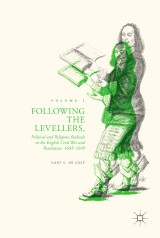Details

Following the Levellers, Volume One
Political and Religious Radicals in the English Civil War and Revolution, 1645-1649|
106,99 € |
|
| Verlag: | Palgrave Macmillan |
| Format: | |
| Veröffentl.: | 24.11.2017 |
| ISBN/EAN: | 9781137268433 |
| Sprache: | englisch |
Dieses eBook enthält ein Wasserzeichen.
Beschreibungen
<p>This book reinterprets the Leveller authorships of John Lilburne, Richard Overton and William Walwyn, and foregrounds the role of ordinary people in petitioning and protest during an era of civil war and revolution. The Levellers sought to restructure the state in 1647-49 around popular consent and liberty for conscience, especially in their <i>Agreement of the People.</i> Their following was not a ‘movement’ but largely a political response of the sects that had emerged in London’s rapidly growing peripheral neighbourhoods and in other localities in the 1640s. This study argues that the Levellers did not emerge as a separate political faction before October 1647, that they did not succeed in establishing extensive political organisation, and that the troop revolt of spring 1649 was not really a Leveller phenomenon. Addressing the contested interpretations of the Levellers throughout, this book also introduces Leveller history to non-specialist readers.</p><p></p><p></p>
<p><b>CHAPTER ONE: INTRODUCTION: THE LEVELLERS, THEIR FOLLOWERS, AND THE HISTORIANS.- CHAPTER TWO: LEVELLER CONTEXTS.- CHAPTER THREE: LEVELLER ORIGINS.- CHAPTER FOUR: THE EMERGENCE OF THE LEVELLERS<i>,</i> 1647.- CHAPTER FIVE:</b> <b>THE LEVELLERS AND THE <i>AGREEEMENT,</i> 1647-8.- CHAPTER SIX: THE LEVELLERS AND THE ENGLISH REVOLUTION, 1648-9.- CHAPTER SEVEN: THE LEVELLER CHALLENGE TO THE COMMONWEALTH REGIME, 1649.- CHAPTER EIGHT: CONCLUSION: THE ENDURANCE OF THE LEVELLERS.</b></p><div><b><br></b></div>
Gary S. De Krey is Emeritus Professor of History at St. Olaf College in Minnesota, USA. A past president of the Midwest Conference on British Studies, he has published two books about London politics in the late Stuart era (1660-1714) as well as <i>Restoration and Revolution in Britain</i> (Palgrave Macmillan, 2007).<p></p>
<p>This book reinterprets the Leveller authorships of John Lilburne, Richard Overton, and William Walwyn and foregrounds the role of ordinary people in petitioning and protest during an era of civil war and revolution. The Levellers sought to restructure the state in 1647-49 around popular consent and liberty for conscience, especially in their <i>Agreement of the People.</i> Their following was not a ‘movement’ but largely a political response of the sects that had emerged in London’s rapidly growing peripheral neighbourhoods and in other localities in the 1640s. This study argues that the Levellers did not emerge as a separate political faction before October 1647, that they did not succeed in establishing extensive political organisation, and that the troop revolt of spring 1649 was not really a Leveller phenomenon. Addressing the contested interpretations of the Levellers throughout, this book also introduces Leveller history to non-specialist readers.</p><p></p><p></p>
<p>Argues that the Levellers were not a cohesive movement, but rather a political expression of London’s growing sectarian population in the 1640s</p><p>Focuses on the Levellers as an urban phenomenon, situating both leaders and followers in their London milieu</p><p>Offers an extensive analysis of the social following of the Leveller writers of 1646-49, placing these ideas in the broader context of libertarian political and religious agitation</p><p>Includes supplementary material: sn.pub/extras</p>
Argues that the Levellers were not a cohesive movement, but rather a political expression of London’s growing sectarian population in the 1640s<div><br><div>Focuses on the Levellers as an urban phenomenon, situating both leaders and followers in their London milieu</div><div><br></div><div>Offers an extensive analysis of the social following of the Leveller writers of 1646-49, placing these ideas in the broader context of libertarian political and religious agitation</div><div><br></div></div>
Diese Produkte könnten Sie auch interessieren:

The Last Samurai - Japanische Geschichtsdarstellung im populären Kinofilm

von: Daniel Scherrer

34,99 €















